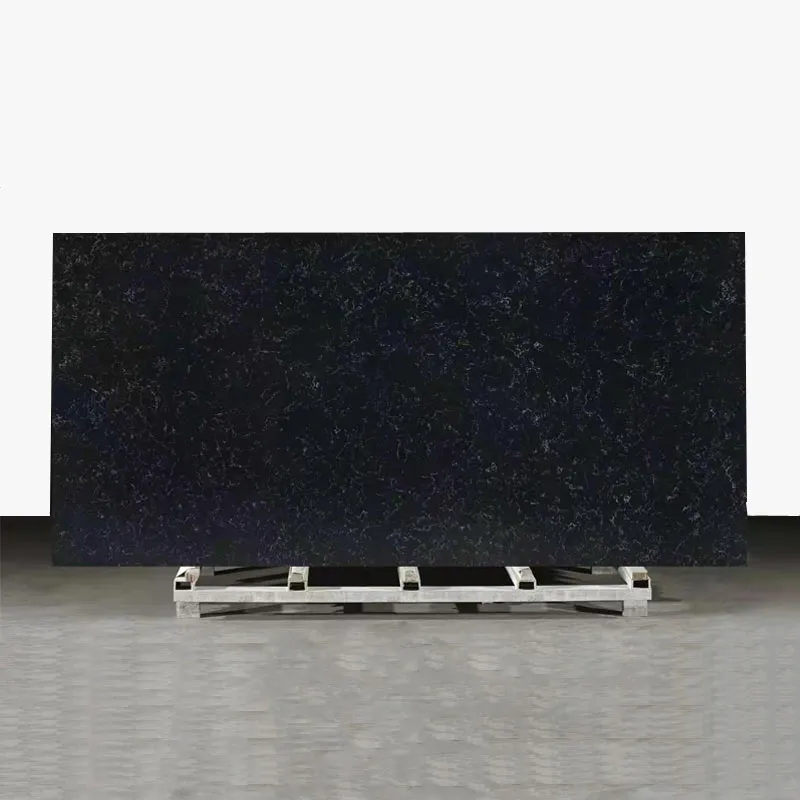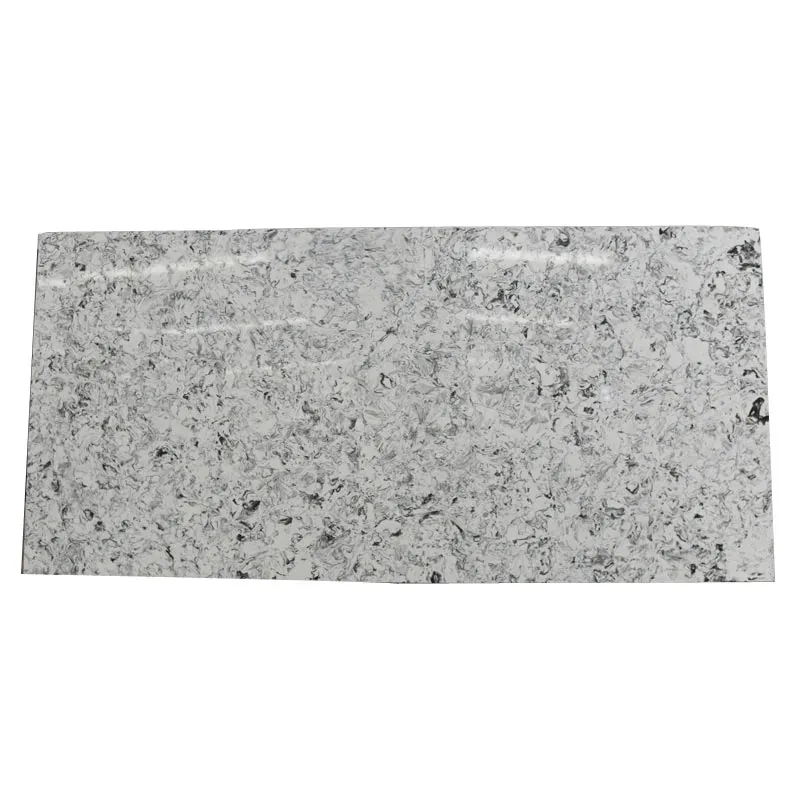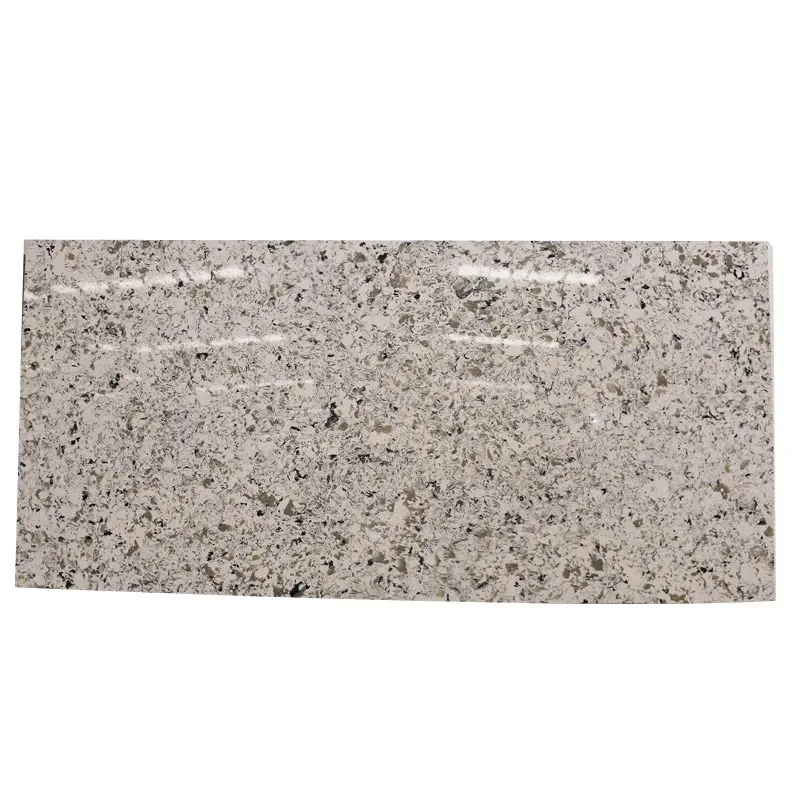As a natural stone, marble has always been popular when people are looking for high-quality, durable and beautiful kitchen and bathroom countertops. The unique texture and luster of marble make it a classic choice for high-end interior decoration. However, despite its beauty, natural marble has some disadvantages that cannot be ignored, such as easy scratching, easy staining and high maintenance costs. With the advancement of technology, manufacturers have developed various alternative materials to provide similar appearance and performance to marble while overcoming the limitations of natural marble. Artificial marble came into being.
This article will explore the definition, characteristics and various names of artificial marble countertops. Although it is similar to natural marble in appearance, it is different in manufacturing process and physical properties. By understanding the types of artificial marble and its common names in the market, consumers can better make choices to meet their dual needs for beauty and practicality.

What is artificial marble?
Artificial marble is a decorative material made of natural marble powder, resin, pigment and other materials through a synthetic process. Its main purpose is to imitate the appearance of natural marble, but it has more advantages in physical properties. Artificial marble overcomes some of the shortcomings of natural stone, such as brittleness, water absorption, and difficulty in processing. Through modern manufacturing technology, artificial marble can achieve clear texture, uniform color, and stronger stain resistance and durability.
Material composition
Artificial marble is mainly composed of two materials: mineral powder and resin. Mineral powder mainly comes from natural minerals such as marble, limestone, calcite, etc. After crushing and screening, it is mixed with resin and pigment, and then formed into a plate with a similar appearance to natural marble through high-temperature and high-pressure molds. The manufacturing process of this material enables it to have more advantages in physical properties.
● Mineral composition: The mineral powder used in artificial marble usually accounts for more than 90% of the overall material, ensuring that its appearance and texture are close to natural marble.
● Resin and pigment: Resin acts as a binder, while pigment is used to adjust color and texture to ensure that the finished product has a variety of appearance options.
What are the advantages and disadvantages of artificial marble?
Compared with natural marble, artificial marble has significant advantages in cost, performance and maintenance, but there are also some disadvantages.
Advantages of artificial marble:
● Lower cost: Due to the relatively cheap raw materials and more efficient manufacturing process, the price of artificial marble is usually lower than that of natural marble.
● Controllable color and texture: By adding pigments and adjusting the molding process, artificial marble can be customized in a variety of colors and textures to meet the needs of different customers.
● Strong durability: Artificial marble has a high hardness, is not easy to scratch or crack, and is heat-resistant and stain-resistant, suitable for places with frequent daily use such as kitchens and bathrooms.
● Easy to maintain: Compared with natural marble, artificial marble has a lower water absorption rate and is not easy to stain, so daily maintenance is relatively simple.
Disadvantages of artificial marble:
● Lack of natural feel: Although the appearance of artificial marble can highly simulate natural marble, its texture still appears to be more artificial for people who pursue a natural feel.
● Lack of uniqueness: Each slab of natural marble is unique, while due to industrial production, the texture and color of artificial marble tend to be unified, lacking the unique personality of natural stone.

What is the name of artificial marble countertops?
Throughout the history of artificial marble, as manufacturing processes and technologies have continued to improve, this material has had a variety of different names and brands. These names not only reflect the composition and characteristics of the material, but also help consumers identify different types of artificial marble in the market.
Engineered Stone
"Engineered stone" is a broad term used to describe materials made from natural stone powder bonded with resin. Quartz countertops are a more common variety of engineered stone, but artificial marble also falls into this category. Compared with natural marble, engineered stone has higher hardness and lower water absorption, making it very popular in environments with high humidity, such as kitchens and bathrooms.
Engineered stone is also known as composite marble in the international market, a name that reflects its characteristics of combining natural minerals with artificial components.
Cultured Marble
Artificial stone, or imitation marble, is a decorative material synthesized through resin, stone powder and pigments, and is widely used in interior decoration and countertop production. The name reflects the "imitation" nature of this material, that is, it attempts to imitate the appearance of natural marble, but improves its performance through synthetic technology. The advantage of artificial stone is that it is relatively affordable and the manufacturing process is flexible, and the color and texture can be customized according to customer needs.
Quartz Marble
Although the name "quartz marble" sounds like a combination of two different materials, it is actually a specific type of artificial marble, the main components of which are a mixture of quartz and resin. Quartz is harder than marble, so this material has better scratch resistance and stain resistance. Quartz marble is widely used in places such as kitchen countertops and bathroom countertops that require high strength and durability.
This material is sometimes also called synthetic marble, emphasizing its characteristics of chemical and physical synthesis during the manufacturing process.
Marble Slabs
In the market, artificial marble is sometimes directly called "marble slabs" to highlight its similarity in appearance to natural marble. Although it is not entirely made of natural stone, consumers often confuse it with real marble because its appearance and usage scenarios are very similar to natural marble.
This name is more common in building material stores and decoration markets, especially in large-scale engineering projects or high-end residential decoration, consumers often choose marble slabs to replace natural marble to reduce costs.
Eco-Friendly Stone
With the improvement of environmental awareness, manufacturers have also launched so-called "eco-friendly stone", emphasizing the environmental protection characteristics of artificial marble. Since the production process of artificial marble has less impact on the environment than natural stone mining, some manufacturers promote it as a sustainable decorative material. Eco-friendly stone not only simulates marble in appearance, but also strives to reduce energy consumption and carbon dioxide emissions during the production process.
This material is also called eco-friendly marble, which is particularly favored by consumers who pay attention to environmental awareness and sustainable development.
What are the application scenarios of artificial marble?
1. Kitchen countertops: Due to its durability and stain resistance, artificial marble is widely used in kitchen countertops. Its surface does not easily absorb grease and liquids, and it is also very convenient to clean. At the same time, the rich color selection and customizable texture make it easy to integrate into various kitchen design styles.
2. Bathroom countertops: Bathrooms are another common application site for artificial marble. Because artificial marble has excellent waterproof performance and can effectively resist the erosion of water vapor, it has become an ideal choice for bathroom sinks, shower countertops and bathtub surrounds.
3. Wall and floor decoration: In addition to countertops, artificial marble can also be used for wall and floor decoration, especially in occasions where large areas of stone are required, such as hotel lobbies, office reception areas, etc. Its lightness and easy processing make it perform well in these scenes, and it is cheaper than natural marble.

How to choose artificial marble?
1. Choose according to the use scenario: Different artificial marbles have different characteristics, so when choosing, you need to consider the specific use scenario. For example, kitchen countertops require high stain resistance and heat resistance, while bathroom countertops require waterproofness and moisture resistance.
2. Choice of color and texture: A significant advantage of artificial marble is its diversity of color and texture. Consumers can choose the right color and texture according to their own decoration style to achieve the ideal decorative effect.
3. Budget and quality: The prices of different types of artificial marble vary greatly. Consumers should weigh quality and price according to their budget and actual needs when choosing. Although high-quality artificial marble is more expensive, it performs better in durability and aesthetics.
Rongguan excels in producing durable and stylish building materials, including artificial marble and Roman clay roof tiles. We serve buyers from North America, Europe, and the Middle East with factory-direct pricing, customizable designs, and reliable delivery. Whether you’re purchasing in bulk or need a one-time order, we guarantee satisfaction.

